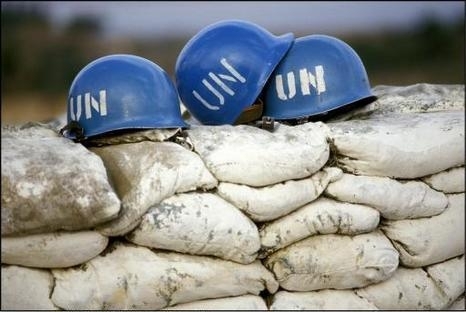Please support our coverage of democratic movements and become a supporting member of rabble.ca.
Between June 21 and July 1 — National Aboriginal Day to Canada Day — we’ll be featuring a series of articles examining and critiquing the uses of Canadian identity, the resurgence of Indigenous movements for justice, and the ways in which activists and thinkers across these lands are addressing these fundamental questions. Read Robert Lovelace’s earlier reflections on National Aboriginal Day here.
Myths can hurt.
Adulation of Lester Pearson’s supposed “peacekeeping” is an obstacle to building a genuinely progressive Canadian foreign policy.
In a recent article, Green Party of Canada leader Elizabeth May wrote: “Sadly, under Stephen Harper, the role of our diplomatic corps has been de-emphasized with embassies closing, diplomats treated as irrelevant, and Canada’s respect for multilateralism itself called into question. Our role as peacemakers, a role invented by former Prime Minister Lester Pearson, has also fallen.”
Days earlier the president of the Rideau Institute, Steven Staples, co-authored a column in the Ottawa Citizen decrying the current government’s lack of commitment to “peacekeeping.” It noted: “Lester B. Pearson was awarded the Nobel Peace Prize for promoting ‘peacekeeping,’ as it came to be known, a project that helped to define our national identity and character.”
In a major international affairs speech in Montréal last February the leader of the official opposition, Tom Mulcair, focused on how Harper was breaking with Pearson’s purported legacy. He repeated a variation of his claim that “Lester Pearson was a model for what Canada has done in the past and should be doing today.”
If Mulcair actually believes this statement — he likely knows no more about Pearson’s foreign-policy legacy than the myth of ‘peacekeeper’ — the NDP leader has a lot to defend.
Pearson’s record speaks for itself:
-He had Canada deliver weapons to the French to put down the Algerian and Vietnamese independence movements.
-Asked in Parliament, Pearson refused to call for Nelson Mandela’s release from prison.
-Pearson backed the mid-1950s CIA coups in Iran and Guatemala.
-He incited individuals to destroy a Canadian peace group after it called for the outlawing of nuclear weapons.
-Pearson threatened to quit as external affairs minister if Canada failed to deploy ground troops to Korea.
-Most controversially, he agreed to have Canada’s representatives to the International Control Commission for Vietnam spy for the U.S. and deliver their bombing threats to the North Vietnamese leadership. This is the main reason Noam Chomsky dubbed Pearson a war criminal.
Despite claims to the contrary, Pearson was a staunch supporter of the U.S. war in Vietnam. “My government,” Pearson told Parliament in the spring of 1965, “supports the purposes and objectives of United States policy in Vietnam.” On another occasion he told the House of Commons: “This government had supported the policy of the United States in Vietnam and wished to continue that support.”
A speech Pearson delivered at Temple University in Philadelphia in April 1965 is the most cited example of a Canadian leader (supposedly) opposing US militarism. Here is part of his speech at Temple: “The government and great majority of people of my country have supported wholeheartedly the U.S. peacekeeping and peacemaking policies in Vietnam.” Pearson then called for a short-term cessation in U.S. bombing of the North (which would take place months later and when Washington restarted their bombing campaign Pearson publicly justified it).
Rather than the widely disseminated caricature of Pearson as a peace-promoting politician, he should be known as the individual most responsible for Canada’s post-World War II shift away from British imperialism and towards the US version. In his Memoirs Pearson explained: “My experience in Washington [envoy extraordinaire and ambassador between 1942 and 1946] convinced me that relations with our neighbour were bound to be far and away the most important part of Canada’s foreign-policy. Sometimes Pearson was astoundingly forthright about his vision of Canada-US relations. He believed this country “voluntarily and wholeheartedly accepted the leadership of the United States” and even argued that Canada had a special role “interpreting U.S. foreign policy to other nations.” In his memoirs Pearson also described the formation of the US-led NATO, not peacekeeping, as the “most important thing I participated in.”
On a host of issues, Pearson’s foreign policy resembles that of Stephen Harper. Yet a slew of “progressives” have tried to counter-pose Pearson’s supposed humanistic internationalism to Harper’s aggressive militarism.
Whether conscious of it or not, leftists calling for Ottawa to follow Pearson’s legacy do so to gain establishment credibility. It is a way of saying that you support the fundamentals of Canadian foreign policy.
In the current political climate it is nearly impossible to survive as a mainstream commentator/politician if you say Canadian foreign policy has always been self-serving/elite-driven or that no government has come even close to reflecting their self-professed ideals on the international stage. Rather than forthrightly criticize this country’s history, most critical commentators oppose current policy by calling for a return to a mythical ‘golden era’ of Canadian foreign policy. This type of criticism is more acceptable, partly because by linking criticism of ongoing practices to a ‘golden era’ of progressive Canadian foreign policy one (implicitly) downplays the structural character of the problem.
Since only a narrow spectrum of opinion is permitted in the dominant media, debates about foreign affairs are deeply flawed. Almost all mainstream commentators express trust in western interventions. Most of those who are given a position to comment support Western imperialism, either the hardline neoconservative version or a softer Responsibility to Protect/ peacekeeping form. Almost no one says the Global South would do better with less Canada.
It makes sense for someone who believes in Western power and an elite-dominated foreign policy to portray Pearson positively. But why would someone on the Left deify him?
Yves Engler is the author of Lester Pearson’s Peacekeeping: The Truth May Hurt. His most recent book is The Ugly Canadian: Stephen Harper’s foreign policy.



